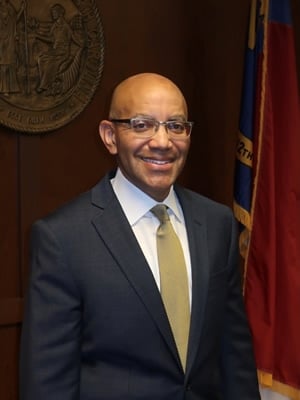You have /5 articles left.
Sign up for a free account or log in.

Thomas Stith
North Carolina Community College System
The North Carolina State Board of Community Colleges held an emergency meeting Wednesday to select an interim president of the state community college system, a day after the current president announced plans to step down.
President Thomas Stith’s resignation takes effect Friday after only 18 months in the role.
“It has been an honor to lead the NC Community College System alongside well-respected college presidents, professionals, dedicated educators and inspirational students,” he said in the news release announcing his resignation. He praised the system for having “enhanced its offerings” amid the “uncharted waters” of the COVID-19 pandemic.
“I pray the NC Community College Board will embrace a vision for our system that will meet the needs of our fast growing and richly diverse state,” he added.
The 22-member board selected William Carver, former president of Nash Community College, as interim president of the system. It will be his second time in the interim role; he also served as interim president in August 2020 after Stith’s predecessor Peter Hans left to lead the University of North Carolina system. Hans had spent a little over two years in the position.
Burr W. Sullivan, chair of the board, said in the release that the board will soon begin the search for a permanent president of the 58-college system, one of the largest in the nation.
“Despite a change in leadership, the important work of the Great 58 community colleges will continue,” Sullivan said. “The Board remains confident and committed to meeting the higher education and training needs of our citizens and businesses, especially during this critical time.”
Stith previously headed the U.S. Small Business Administration in North Carolina. He also was chief of staff to Republican former governor Pat McCrory and a former Durham city council member.
No reason was given for Stith’s departure, though his resignation came several days after the board held a three-hour closed-session meeting partly dedicated to a midyear review of his progress toward goals set for him by the board. The board set five key goals for Stith in March, including improving hiring, retention and morale at the system office; ensuring better communication between the system office and campus presidents; addressing enrollment declines, particularly at hard-hit rural campuses; and reducing “red tape,” based on feedback from campus presidents, reported The Assembly, a North Carolina digital magazine. This came after a reportedly tense one-year review of his performance that lasted three and a half hours in a closed session in January.
“I won’t get into the details of the personnel review, but we had a robust conversation,” Stith told The Assembly in a story published last month.
Sullivan told The Assembly at the time that he was “very optimistic” Stith would achieve the outlined goals “with a lot of hard work and a lot of support from his staff.” He said board members were “not happy” with frequent turnover in the system office and had since “set that expectation in front of the president as clearly as we can.”
Stith and Sullivan did not respond to requests for comment.
The system has dealt with rampant leadership churn in recent years. Stith was the sixth president of the system in the last seven years, including two interim presidents, reported EducationNC, a North Carolina news source focused on education. Meanwhile, 25 campuses had to hire new presidents in the last three years, according to a 2022 board report. Board members have also expressed concerns about understaffing and high attrition in the system office.
Consultants at CampusWorks, a consulting firm hired to assess the system office, noted at a board meeting in April that they found some apprehension among system office employees about leadership churn.
Staff members “feel fairly disconnected and unclear about their role going forward,” partly because “the system and its colleges have had a great deal of transient leadership over the years,” Liz Murphy, CEO and board chair at CampusWorks, said at the meeting. “Over the last 10 or 12 years, there has been a lot of movement in leadership. And they are a little unsteady about, you know, ‘Can we count on President Stith to be here?’ I’m just calling it out.”
Stith said at the time that employees’ concerns about the system’s leadership history presented “an opportunity to build trust.”
Terrence MacTaggart, senior consultant and senior fellow at the Association of Governing Boards of Universities and Colleges, noted an increase in interim or vacant leadership positions since the pandemic began.
He believes system leaders in particular are experiencing new pressures that can contribute to tensions with board members and abrupt resignations.
“System heads are highly political jobs in the best of times and even more so now with the partisan intensity within states and among states,” said MacTaggart, who previously led the Minnesota State System and the University of Maine system. Often, there are “left-right ideological splits … between system leaders, board members and the Legislature. It’s not a failure to communicate, it’s a failure to agree on kind of fundamental principles.”
He also noted that board members by and large gave system leaders more latitude during the pandemic to make rapid decisions about distance education and safety protocols. But the boards are now “surging back,” and members are reasserting their authority and, in some cases, making unpopular decisions such as mergers, consolidations and cuts to humanities and the liberal arts, which can make the face of the system “a less than popular figure.”
Those stressors are on top of the “new age of anxiety” and “new age of divisiveness” wrought by the pandemic that MacTaggart also believes affects relationships between board members and system leaders.
Ultimately, “the turnover reflects the instability of the times and contributes to it as well,” he said.





